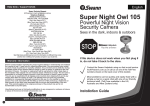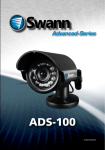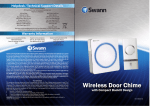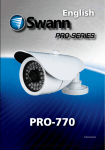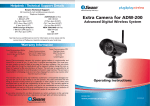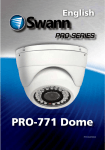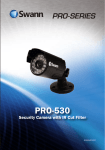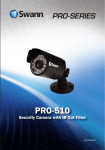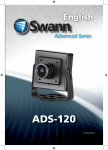Download Swann ADS-180
Transcript
Helpdesk / Technical Support Details Swann Technical Support All Countries E-mail: [email protected] Telephone Helpdesk AUSTRALIA toll free USA toll free 1300 138 324 1-800-627-2799 (M 9am-5pm AUS ET) (Su, 2pm-10pm US PT) (M-Th, 6am-10pm US PT) (Tu-F 1am-5pm AUS ET) (Sa 1am-9am AUS ET) (F 6am-2pm US PT) NEW ZEALAND toll free USA Exchange & Repairs 1-800-627-2799 (Option 1) 0800 479 266 UK (M-F, 9am-5pm US PT) 0203 027 0979 See http://www.worldtimeserver.com for information on time zones and the current time in Melbourne, Australia compared to your local time. English Warranty Information Swann Communications USA Inc. 12636 Clark Street Santa Fe Springs CA 90681 USA Swann Communications Unit 13, 331 Ingles Street, Port Melbourne Vic 3207 Swann Communications LTD. Stag Gates House 63/64 The Avenue SO171XS United Kingdom Swann Communications warrants this product against defects in workmanship and material for a period of one (1) year from it’s original purchase date. You must present your receipt as proof of date of purchase for warranty validation. Any unit which proves defective during the stated period will be repaired without charge for parts or labour or replaced at the sole discretion of Swann. The end user is responsible for all freight charges incurred to send the product to Swann’s repair centres. The end user is responsible for all shipping costs incurred when shipping from and to any country other than the country of origin. The warranty does not cover any incidental, accidental or consequential damages arising from the use of or the inability to use this product. Any costs associated with the fitting or removal of this product by a tradesman or other person or any other costs associated with its use are the responsibility of the end user. This warranty applies to the original purchaser of the product only and is not transferable to any third party. Unauthorized end user or third party modifications to any component or evidence of misuse or abuse of the device will render all warranties void. By law some countries do not allow limitations on certain exclusions in this warranty. Where applicable by local laws, regulations and legal rights will take precedence. © Swann Communications 2011 FCC Verification This equipment has been tested and found to comply with the limits for Class B digital device, pursuant to part 15 of the FCC Rules. These limits are designed to provide reasonable protection against harmful interference in a residential installation. This equipment generates, uses and can radiate radio frequency energy and, if not installed and used in accordance with the instructions, may cause harmful interference to radio or television reception, which can be determined by turning the equipment off and on, the user is encouraged to try to correct the interference by one or more of the following measures: • Reorient or relocate the receiving antenna • Increase the separation between the equipment and the receiver • Connect the equipment into an outlet on a circuit different from that to which the receiver is connected • Consult the dealer or an experienced radio/TV technician for help WARNING: Modifications not approved by the party responsible for compliance could void user’s authority to operate the equipment. 8 ADS-180 M180CAM150411E 1 About the Camera Congratulations on your purchase of this ADS-180 from Swann! You’ve chosen a great little self contained, easy to install entry-level CCTV camera. This manual will walk you through positioning, installing, connecting and using your camera, and offer some tips to help you get the most out of your security monitoring system. What will it see? The ADS-180 has a 6mm, 37° lens built-in which allows it to focus its attention onto one specific area. What does this mean for you when placing it? • The camera will focus on the one particular area in front of the lens, but won’t see much happening to the sides of it. You’ll need to aim the camera specifically at what you want to see. • Objects and people will look like they are slightly closer 37° to the camera than they really are. You’ll be able to monitor a space which is as long (or longer) than it is wide. The ADS-180 is great for monitoring long, narrow spaces such as hallways or corridors. It’s also great for monitoring a specific space, such as a doorway, smaller room or staircase. It’s best mounted high-up in a corner looking down into the space being monitored, so that it can look over intervening obstacles. Also, the higher the camera is mounted, the harder it’ll be for an intruder to access the camera or interfere with it. Rules is Rules Regardless of all the tweaking of the lens and image processing you do, there are a few immutable things that are true for all cameras, CCTV or otherwise. • The closer the camera is to what you want to see, the more detail you’re going to get. Really, there’s no substitute for proximity. • Areas with varied lighting conditions are hard to view completely, with any camera. If the bright bits are exposed correctly, then the shadows will “black out”. If the shadowy areas are exposed correctly, then the bright bits will overexpose and “white out”. Aiming the camera at an evenly lit area will always give the best results. • Technical Specifications Image Sensor Video Quality Effective Pixels Min. Illumination White Balance Electronic Shutter Technical Specifications Video 1/4” CMOS 400 TV Lines NTSC: 656 x 492 Gain Control Backlight Comp. Wide Dynamic Range Lens Viewing Angle 0 Lux (IR on) Automatic NTSC: 1/60 ~ 1/15 000 PAL: 1/50 ~ 1/15 000 Automatic Yes No 6mm 37° Range IR Cut Filter Number of IR LEDs Infrared Wavelength IR LED Life (Average) Night Vision Up to 10m (33ft) No 30 940nm 10, 000 hours Operating Power Operating Temp. Casing Dimensions (Camera) Dimensions (Stand) Weight General DC 12V -10°C ~ 50°C (14°F ~ 122°F) Aluminium 2.5” x 2.8” x 2.5” 65mm x 70mm x 65mm 2.8” x 2.3” x 2.3” 72mm x 60mm x 60mm 165g / 0.4lbs (approx) That “image enhancement” stuff that they do on CSI or 24 is all lies. You can’t zoom in indefinitely on a video image. Licence plates are only readable from a few meters (a dozen or so feet) away. If someone’s head is represented by three pixels, that’s it. Sorry. This is technology, not magic. This is a great entry-level CCTV camera, but it’s still an entry-level CCTV camera - it can’t see much better than you can! Still, it does make for good television. 2 7 Troubleshooting Choosing a Location Problem: At night, all I see is white. Solution: The camera is most likely looking through a window. At night, the infrared light the camera uses to see in the dark can ‘bounce back’ off a reflective surface (such as glass, water, spider webs, some ceramics and so on) and effectively blind the camera. If you want to see outside, mount the camera outside - we made it weather resistant for a reason! Problem: I see only a blank screen where my image should be. Solution: Check the wiring to the camera, and ensure the camera is being supplied power from the included power adapter. Try using a different video lead, or connecting the camera to a different television or monitor. Be sure there are no devices interrupting your signal, such as a DVR or VCR that isn’t outputting the signal correctly. Problem: I can’t see anything at night. Solution: The maximum range of the night vision is just that, the maximum range. If there’s nothing in this range, you won’t see anything. Also, some dark objects (like the proverbial black cat) may not reflect enough light to be seen except as a silhouette if the background is brighter. Some objects which can easily be seen in visible light don’t reflect much infrared light. 6 The ADS-180 can be mounted just about anywhere, provided there is some protection against direct sunlight and rain/moisture (it’s weather resistant, but long-term exposure will eventually interfere with the operation of the camera). Some of the things you’ll have to consider when choosing a location are: • What you want to monitor, and where you’ll get the best view of it. • How you’re going to connect the camera to your monitoring system. • How to keep the camera out of harm’s way. Up high in protected corners is a good option. Mounting The camera mounts onto a flat surface using screws. The surface must have sufficient strength to hold the camera. Materials such as hardwood, brick or masonry are good options, and we’ve included all the gear you’ll need to mount it there (except the tools - sorry, you’ll still need your own drill). You can mount the camera onto a metal surface, but you’ll need to supply your own mounting hardware. To mount the camera: • Using the holes on the camera stand as a guide, mark the locations on your wall/ceiling to drill. Make sure the wall/ceiling is thick and strong enough that you won’t drill through it. • If the wall is masonry, brickwork or similar, use the provided wall plugs. If the wall is made of wood, then the camera can be screwed directly onto the wall. • Ensure that the cable is protected from the weather. The camera is weather resistant, but the cable (particularly the power and video-out plugs) is not. • Once the camera has been mounted, ensure that it is securely fixed in place. The camera is vandal resistant, but that won’t help if an intruder can remove the whole camera! 3 About the Camera 3B FOR 4 CAMERA PACKS Connect the extension cables DC socket to one of the four sockets on the power splitter. Then, plug the single end of the power splitter to the DC plug on the power adaptor. 4 1 Connect the camera’s DC and BNC socket cable to the extension cable’s DC and BNC plugs 2A. Connecting Directly to TV 2 Connect the BNC to RCA Adapter and connect to Video Input on your TV or VCR 3A Plug in the camera power adapter into a wall socket FOR A SINGLE CAMERA Connect the extension cables DC socket to the DC plug on the power adapter 2B. Connecting to Your Existing DVR 2 Connect the BNC Extension Cable to an open channel on the back of the DVR INPUT 4 5




